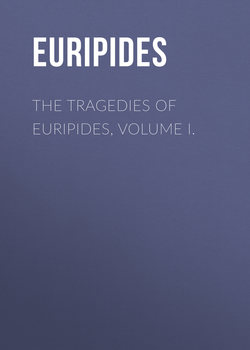Читать книгу The Tragedies of Euripides, Volume I. - Euripides - Страница 15
HECUBA
HECUBA
POLYMESTOR, HECUBA, SEMICHORUS
ОглавлениеPOLY. Oh me! I wretch am deprived of the sight of mine eyes.
SEMI. Heard ye the shriek of the man of Thrace, my friends?
POLY. Oh me; there again – Oh my children, thy miserable butchery!
SEMI. My friends, some strange ills have been perpetrated within the tents.
POLY. But for all your nimble feet, ye never can escape me, for by my blows will I burst open the recesses of these tents.
SEMI. Behold, he uses violently the weapon of his heavy hand. Will ye that we fall on; since the instant calls on us to be present with assistance to Hecuba and the Trojan dames?
HEC. Dash on, spare nothing, break down the gates, for thou never shalt replace the clear sight in those pupils, nor shalt thou behold alive those children which I have slain.
SEMI. What! hast thou vanquished the Thracian? and hast thou got the mastery over this host, my mistress? and hast thou done such deeds, as thou sayest?
HEC. Thou wilt see him quickly before the house, blind, with blind wandering steps approaching, and the bodies of his two children, whom I have slain with these most valiant Trojan women; but he has felt my vengeance; but he is coming as thou seest from the tent. But I will retire out of his way, and make good my retreat from the boiling rage of this most desperate Thracian.
POLY. Alas me! whither can I go? where stand? whither shall I direct my way, advancing my steps like the four-footed mountain beast on my hands and on my feet in pursuit? What new path shall I take in this direction or in that, desirous of seizing these murderous Trojan dames, who have utterly destroyed me; O ye impious, impious Phrygian daughters! Ah the accursed, in what corner do they shrink from me in flight? Would that thou, O sun, could'st heal, could'st heal these bleeding lids of my eyes, and remove this gloomy-darkness. Ah, hush, hush! I hear the carefully-concealed step of these women. Whither shall I direct my course in order that I may glut myself on the flesh and bones of these, making the wild beasts' banquet, inflicting vengeance on them, in return for the injuries done me. Wretch that I am! Whither, whither am I borne, having left my children deserted, for these fiends of hell to tear piecemeal, a mangled, bleeding, savage prey to dogs, and a thing to cast out on the mountains? Where shall I stand? Whither turn? Whither go, as a ship setting her yellow canvas sails with her sea-washed palsers, rushing to this lair of death, the protector of my children?
CHOR. O miserable man, what intolerable evils have been perpetrated by thee! but on thee having done base deeds the God hath sent dreadful punishment, whoever he be that presses heavy on thee.
POLY. Alas! alas! O Thracian nation, brandishing the spear, warlike, bestriding the steed, nation ruled by Mars; O ye Greeks, sons of Atreus; I raise the cry, the cry, the cry; Come, come, hasten, I entreat you by the Gods. Does any hear, or will no one assist me? Why do ye delay? The women have destroyed me, the captive women. Horrible, horrible treatment have I suffered. Alas me for my ruin! Whither can I turn? Whither can I go? Shall I soar through the ethereal skies to the lofty mansions where Orion or Sirius dart from their eyes the flaming rays of fire: or shall I hapless rush to the gloomy shore of Pluto?
CHOR. It is pardonable, when any one suffers greater misfortunes than he can bear, for him to be desirous to quit a miserable life.
